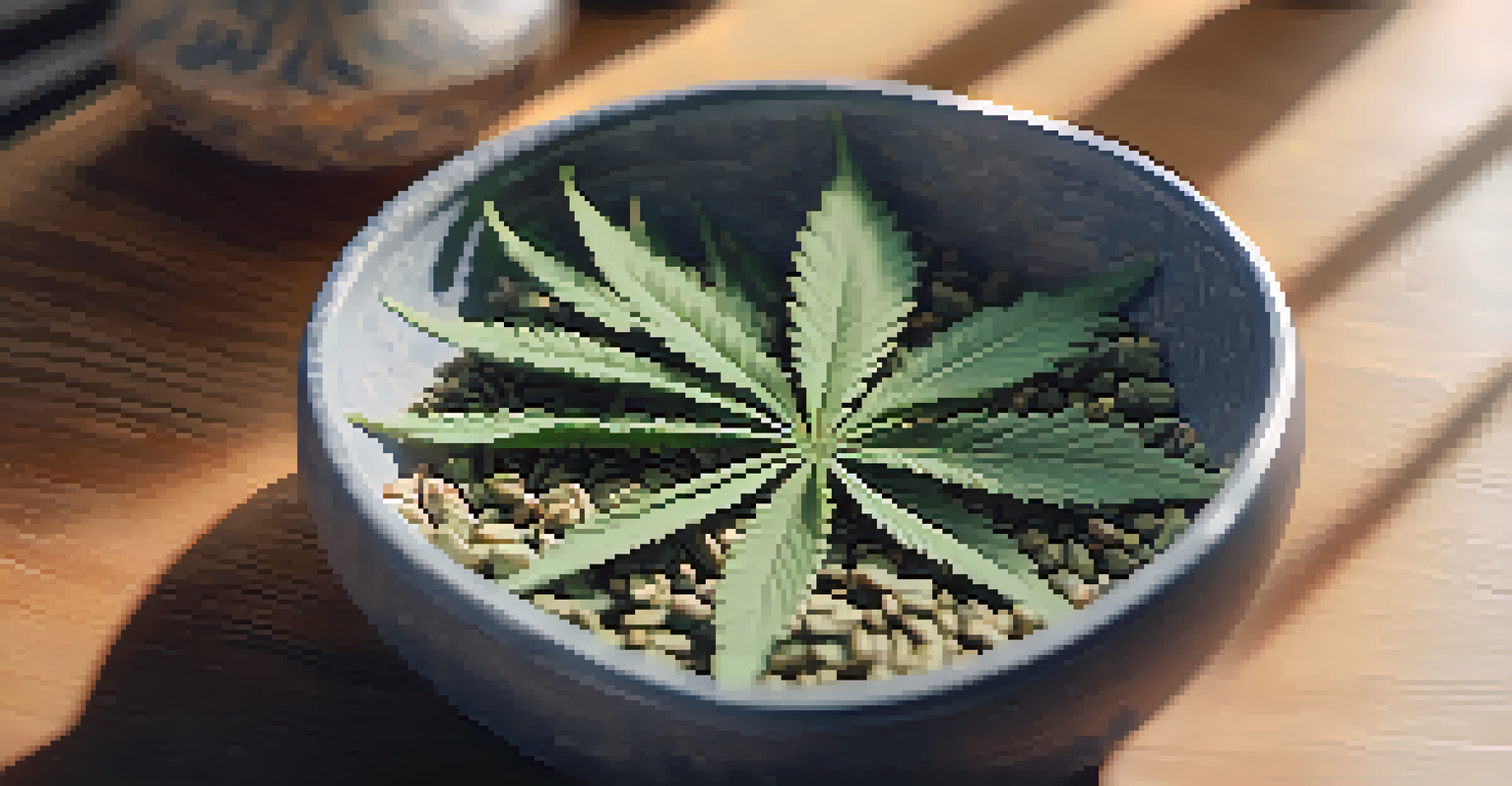Marijuana and Spiritual Healing in Traditional Practices

Understanding Marijuana's Role in Spiritual Traditions
Marijuana, often called cannabis, has been used in various cultures for centuries, primarily for its psychoactive properties. Many indigenous communities regard it as a sacred plant, believing it connects them to the spiritual realm. This connection is not just about recreation; it’s deeply rooted in rituals aimed at enhancing spiritual experiences and healing.
Marijuana is a sacred herb, an ally for those who seek a deeper connection to the universe.
In traditions like shamanism, practitioners use marijuana to enter altered states of consciousness, which can lead to profound insights and healing. These practices often involve ceremonies where the plant is consumed to facilitate communication with spiritual guides or ancestors. This highlights how marijuana serves as a bridge between the physical and spiritual worlds.
Furthermore, the therapeutic effects of marijuana, such as reducing anxiety or pain, contribute to its role in spiritual healing. Many individuals report that using marijuana enhances their meditation or prayer practices, allowing them to access deeper levels of awareness. This intersection of healing and spirituality showcases the plant’s multifaceted importance in traditional practices.
Cultural Perspectives on Marijuana in Healing Practices
Different cultures have unique perspectives on marijuana and its place in healing. For instance, in some Native American tribes, the plant is used in sacred rituals to promote healing and connect with the spiritual world. These practices often involve communal gatherings where members share their experiences and insights gained through the use of marijuana.

In contrast, some Asian cultures have historically employed marijuana in traditional medicine, viewing it as a remedy for various ailments. For example, in ancient Chinese medicine, cannabis was utilized to treat everything from pain to digestive issues. This medicinal use often overlaps with spiritual practices, as healers may incorporate the plant into rituals to enhance its effectiveness.
Marijuana's Spiritual Significance
Marijuana has been used in various cultures for centuries as a sacred plant that enhances spiritual experiences and healing.
These cultural differences illustrate how marijuana is perceived not just as a substance, but as a tool for spiritual and physical healing. Understanding these perspectives can foster greater respect for the traditions that have shaped the use of marijuana in healing practices globally.
Rituals and Ceremonies Involving Marijuana Use
Rituals and ceremonies involving marijuana vary widely, but they often share common themes of connection, healing, and community. For example, some cultures partake in group ceremonies where participants consume marijuana to create a shared spiritual experience. This collective use can strengthen bonds and create a sense of belonging among participants.
The greatest tool for healing is the connection we have to ourselves and the universe, and sometimes that connection is enhanced by plants like cannabis.
In other traditions, marijuana is used in more personal rituals, where individuals may meditate or reflect on their lives while under its influence. This practice can lead to self-discovery and healing, allowing individuals to confront and process emotional pain in a supportive environment. Such rituals highlight the importance of setting and intention in spiritual healing.
These ceremonies often incorporate music, dance, or chanting, enhancing the overall experience and facilitating a deeper spiritual connection. By integrating marijuana into these practices, participants can access heightened states of awareness, leading to transformative experiences that promote healing.
The Psychological Benefits of Marijuana in Spiritual Healing
Research indicates that marijuana can have significant psychological benefits, which play a crucial role in spiritual healing. Many users report decreased anxiety and increased feelings of connectedness when using the plant, which can enhance their spiritual practices. This psychological relief can create a more open mindset for exploring spiritual concepts and experiences.
Moreover, marijuana has been found to help alleviate symptoms of depression and PTSD, making it a valuable tool for those seeking healing. By addressing these underlying psychological issues, individuals may find it easier to engage in spiritual practices like meditation or prayer, facilitating a deeper connection with themselves and their surroundings.
Cultural Healing Practices
Different cultures view marijuana as a tool for both spiritual and physical healing, integrating it into traditional rituals and medicinal practices.
The psychological effects of marijuana can also lead to shifts in perspective, allowing individuals to view their challenges through a more spiritual lens. This transformation can be pivotal in the healing journey, as it encourages a sense of hope and possibility, which is essential for personal growth and recovery.
Modern Adaptations of Traditional Practices
As society evolves, so do the practices surrounding marijuana and spiritual healing. Many contemporary practitioners are blending traditional methods with modern approaches, incorporating new insights and technologies to enhance their rituals. This adaptation allows for a richer experience that resonates with today's seekers of spiritual growth.
For instance, some modern healers integrate mindfulness techniques into their marijuana rituals, creating a holistic approach that combines ancient wisdom with contemporary practices. This fusion encourages individuals to be more present and aware during their spiritual experiences, maximizing the benefits of both marijuana and meditation.
Additionally, the rise of legal marijuana in various regions has led to an increase in workshops and retreats focused on spiritual healing with cannabis. These events often draw on traditional practices while also appealing to a broader audience, showcasing the plant's versatility as a tool for healing in the modern world.
Challenges and Controversies Surrounding Marijuana Use
Despite its long history in spiritual healing, marijuana usage is not without challenges and controversies. Legal restrictions in various regions can hinder access to the plant for those seeking its healing benefits. Additionally, societal stigma associated with marijuana use may deter individuals from exploring its potential as a spiritual tool.
Moreover, the increasing commercialization of marijuana raises questions about the authenticity of its use in spiritual practices. Some argue that the focus on profit can overshadow the sacred nature of the plant and its traditional uses. This tension highlights the need for education and respect for the cultural significance of marijuana in spiritual healing.
Challenges in Spiritual Use
Despite its historical significance, marijuana use faces legal and societal challenges that can hinder access and authenticity in spiritual practices.
Navigating these challenges requires a careful balance between modern practices and traditional values. By fostering open conversations and a deeper understanding of marijuana's cultural roots, individuals and communities can work towards creating inclusive spaces for spiritual exploration.
The Future of Marijuana in Spiritual Healing Practices
Looking ahead, the future of marijuana in spiritual healing practices appears promising, especially as societal attitudes continue to shift. As more people embrace holistic approaches to wellness, the integration of marijuana into spiritual healing is likely to gain acceptance and recognition. This growing interest can lead to a resurgence of traditional practices and renewed appreciation for their significance.
Furthermore, ongoing research into the therapeutic effects of marijuana may contribute to a deeper understanding of its role in spiritual healing. As science uncovers the complexities of the plant’s effects on the mind and spirit, practitioners can better tailor their approaches to maximize its benefits for healing.

Ultimately, the future of marijuana in spiritual healing will depend on a collective commitment to honoring its cultural roots while exploring new possibilities. By fostering respectful and mindful practices, individuals can ensure that the use of marijuana in spiritual contexts remains a source of healing, connection, and growth for generations to come.